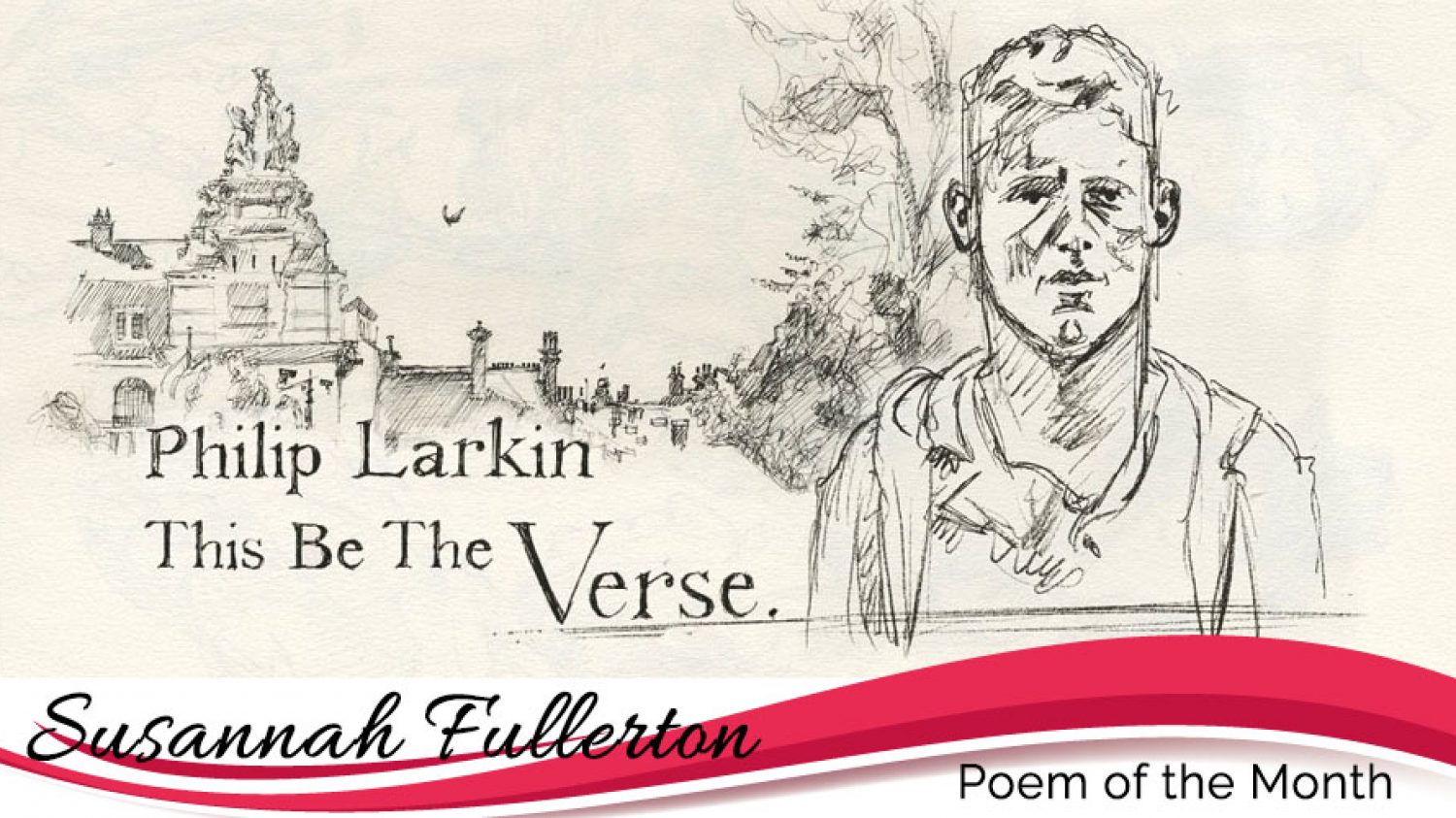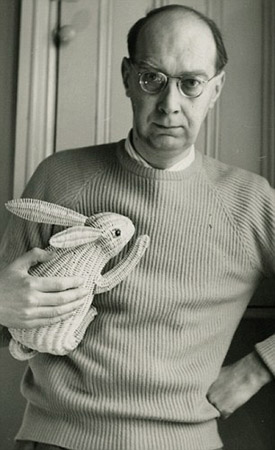Warning: You’d better skip this item if bad language is not your thing. Surely this poem by Philip Larkin (1922 – 1985) has one of the most memorable opening lines ever?
This Be the Verse by Philip Larkin
They fuck you up, your mum and dad.
They may not mean to, but they do.
They fill you with the faults they had
And add some extra, just for you.
But they were fucked up in their turn
By fools in old-style hats and coats,
Who half the time were soppy-stern
And half at one another’s throats.
Man hands on misery to man.
It deepens like a coastal shelf.
Get out as early as you can,
And don’t have any kids yourself.
Ironically, the poet was a devoted son, regularly visiting his mother and writing to her. This poem was written after Larkin had been spending what was probably an over-long holiday with her in Loughborough – did all the little accumulating irritations drive him to write this verse? The poem is about genetic inheritance and upbringing, what we inherit and what we pass on. Our parents mess us up, but it’s not really their fault because they were messed up by their parents. This is the way of humanity – like a coastal shelf where deposits of sand build up, so the misery deepens over generations. You can “get out” by killing yourself or shrugging off any sense of responsibility, or you can refuse to have children and hence not pass the misery on even further (Larkin never married and had no children).
The title of the poem comes from Robert Louis Stevenson’s gorgeous poem Requiem which includes the line “This be the verse you grave for me”. A requiem is a song sung for the dead, and Stevenson’s poem is about death and remembrance by those who loved you. Larkin has written a very different sort of poem about loved ones, showing their influence as extremely enduring, but not at all positive. It’s an emphatic title, as if the poet has suddenly discovered the meaning of life and is going to share it with you. Appropriately for a requiem, Larkin’s poem has a sing-song rhythm to it, as if an actual song, but the cheery rhythm is undercut by the dark theme. Larkin tries to deconstruct the myth of the happy family in his poem.
The opening line is designed to shock, but is a clever choice of words – our parents do “fuck” us “up” into being because they had sex with each other. Or does the unrefined speech indicate that the poet is ignorant and uncouth and knows no better?
The ABAB rhyme scheme is almost like a nursery rhyme (and nursery rhymes are often violent). Larkin’s language describing the way parents mould their children is rather like a baker creating bread and sprinkling currants in it: “They fill you with the faults they had, and add some extra just for you.” Repetition is common in nursery rhymes and in Larkin’s poem the repetition stresses the cyclical operation and theme of the poem.
The first stanza focuses on the individual, the next on the individual and extended family, the third on humanity as a whole. And perhaps its message is, in the end, a positive one – if none of our faults are actually our own fault, then why should we have any sense of responsibility to change or better ourselves?
You can listen to this poem read by the author:
Share your thoughts by leaving a comment.
Poem of the Month, October 2018 – ‘An Arundel Tomb’
Susannah Fullerton: Next Please by Philip Larkin
Poetry Foundation: Philip Larkin
The Complete Poems by Philip Larkin
I only recommend books I have read and know. Some of these links are my affiliate links. If you buy a book by clicking on one of these links I receive a small commission. It doesn’t cost you anything extra, but does help cover the cost of producing my free newsletter.
Comments are moderated, and will not appear until approved.
[DISPLAY_ULTIMATE_PLUS]


Michael
It’s nothing to do with genetic inheritance!
Susannah Fullerton
I think the liens ‘They fill you with the faults they had…” does refer to genetic inheritance.
Rust
They fuck you up, your mum and dad.
They may not mean to, but they do.
I wonder if these two lines have a duel meaning. You could argue that Larkin historically contextualizes the poem along with his own reticence with regard to the world he inhabited on the cusp of the sixties.
“The fuck you up your mum and dad”, could easily relate quite literally to what you parents do to conceive you.
“They may not mean to, but they do” Could be hinting at the rise in unwanted pregnancies at a time of sexual liberation.
Just a thought.
Susannah Fullerton
That’s an interesting interpretation of those famous, or infamous, first lines, and I think you have a good point.
Keke
I love this poem. The first time I read it I feel in love with it. It’s funny but it’s certainly the truth.
Susannah Fullerton
So glad you enjoyed it. I discuss a fabulous poem every month in my free newsletter, ‘Notes from a Book Addict’. You can sign up to it on my website.
Philomena Lapsley
Hi Susannah. Thank you for including one of favourite poems. I was so surprised when first I heard the Larkin audio a few years ago. I’d always read it my head (and read it out loud to others) in the singsong rhythm and accent characteristic of the northern English speech style. Larkin’s rendition is nothing like that! Despite my disappointment, and your well argued case for the nursery rhyme analogy, I’ll continue to do this!
As for the subject matter, I believe it’s about the way dysfunctional relationships are carried down the generations. These days, this might be exacerbated by what we call the cycle of disadvantage. Every time I read the poem, I can imagine child social workers nodding their heads.
The opening line is, I beleve, purely colloquial and not a reference to the manner of one’s conception. It’s intended to be angry and attention seeking, typical of the adolescent male. I reckon he was really pissed off with mum but couldn’t say anything to her face, so here’s the expression of all that frustration. The poetic équivalence of kicking the cat.
Cheers, Philomena
Susannah Fullerton
Yes, I think social workers can really relate to this poem. It is about how cycles of disadvantage and ill-treatment get passed on through the generations. It does sound as if his holiday with Mum had been way too long and he was letting off his frustrations.
I think we all hear poems differently in our heads and then when you hear the author read his own work, it can be really odd. I felt that with Yeats – his Lake Isle read by him was not at all how I thought it should sound.
I do feel he used both senses of the word in the opening line, but we can agree to differ on that point. Glad you found it all thought-provoking.
Christa
Ha, I love this poem and had never known its title, and great to hear Larkin read it. An ex-boss of mine used to work with Larkin for a short time at the Leicester University library. I think the poem reflects the somewhat dour countenance he described Larking as having.
Susannah Fullerton
Oh how interesting that you knew someone who met Larkin. I suspect he was a very dour man, but it’s a fabulous poem, isn’t it.
Margi Abraham
Philip Larkin is an absolute favourite poet of mine and when I first found this poem, I couldn’t believe it was written by the same man who wrote High Windows and Ambulances, not to mention An Arundel Tomb. However, This Be The Verse proved to be the most useful poem when my sons became teenagers; when they blamed me for all their woes and liked to point out all my faults. I would quote it to them so often (and I think the expletives got their attention), that I think we all know this poem by heart in our family!
PS They have grown into fine young men and accept that, however flawed their parents are,they love them very much.
Susannah Fullerton
Yes, it is so incredibly different from his gorgeous Arundel Tomb poem. I have also quoted it to my children, who always looked rather astonished that Mum could use such language. I wouldn’t be without my children for anything, so am glad I did not follow Larkin’s advice. I’m sure you are too!
Margi Abraham
And I certainly hope they don’t follow his advice either! There is that P & P board book waiting on my bookshelf……..
Susannah Fullerton
Yes indeed!
Jennifer
A great poem – thank you, Susannah. Though I don’t agree with his conclusion that the best way to avoid life’s challenges is to avoid having children, I love the poem which has a good deal of truth in it. My own conclusion is that life is challenging whatever you do and children bring a joy to it that can come from no other source.
Susannah Fullerton
I totally agree. I wouldn’t be without my children for anything! But it is a fabulous poem.